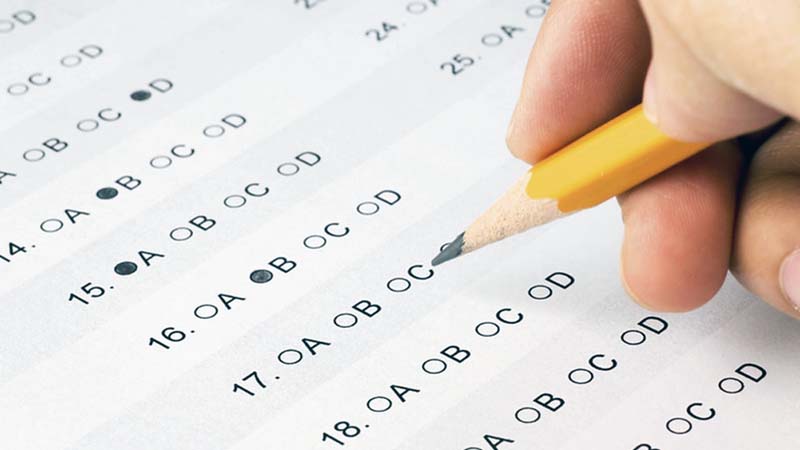For most of the students, taking an online exam is a new and therefore precarious situation, which in turn can increase their anxiety and thus reduce their performance. Dr. Boróka Gács, research associate professor at the Department of Behavioural Sciences compiled some tips that can help them in the coming weeks to prepare for the exams as smoothly as possible.
For most of you, taking an online exam is a new and therefore precarious situation, which in turn can increase your anxiety and thus reduce your performance. You do not, or less know what to expect in this unknown situation, and you may not be sure of your abilities required for it either. The good news is that most of the things that are required for a successful online exam are very similar to what you already know. Yet, there are areas of this genre that, in some ways, require more preparation and greater awareness. For example, it is important for you to be familiar with the platform, which is mostly Teams in our case, so that technical difficulties do not consume unnecessary time and energy or cause increased concerns during the exam.
Below are some tips that can help you in the coming weeks to prepare for the exams as smoothly as possible.
Before the exam: get ready!
- Read and interpret the guidelines and instructions related to the exam. Make sure you can answer the following questions:
- When and “where” (what are the expectations regarding the circumstances, e.g. is a desktop computer or laptop required?) will be the exam?
- Do you have to prepare for a written or oral exam?
- How much time will you have?
- In addition to written or oral exam, exactly what parts
- or types of questions will the exam consist of?
- What aids and tools can you use?
- Is there any other important information specific to the given exam that you need to know?
- Test yourself! If you have the opportunity provided by the instructor, be sure to take advantage of it or create the exam situation for yourself. This will make you feel more familiar and thus safer in the exam situation.
- Check your computer, the reliability of your Internet connection, and your programs to make sure they work to avoid last-minute problems and unnecessary anxiety.
- It is important to study the material in the same way, the same depth. Most mistakes during online exams stem precisely from the fact that we believe it is too simple because we think that some “helpful” information is relatively easy to access and retrieve. You should expect that you will not have time for that, and when you realise this, you will probably even forget what you knew before. Therefore, the best tactic is to prepare in the same way as if you were taking a face-to-face exam.
- Plan and manage your time effectively! Time management, regardless of the online genre, is very important in the exam period. Remember that you may now be even more tempted to do time-consuming activities, therefore it is worth spending a little more time on the material than usual. In addition, it is also important to see in advance what your exam period will look like in whole.
- To avoid these time-consuming activities, consciously exclude these diversionary activities. For example, turn off the notifications on your phone, laptop, turn off the TV, and let your family know what you need, they can help if they do not bother you, especially at the time of the exam!
- Make sure that all the materials you will need to prepare are available to you. It can also cause unnecessary anxiety to realize at the last minute that a note or a lecture material is missing.
In the exam: stay focused!
- Take a deep breath and exhale long before you enter and “arrive” at the exam. As you exhale, imagine that in the meantime everything else disappears, you are just focusing on the exam.
- “Arrive” punctually, in the online world, metacommunication opportunities are reduced, it is not worth risking a good impression by being late.
- In an oral exam, pay attention to your appearance and non-verbal communication. Remember that the examiner’s focus is primarily on your face. At the same time, our attention naturally scans the environment in such a situation as well, so try to find a place where there are no overly intense or distracting stimuli in the background, which could distract him or her.
- Watch the clock, and if you have limited time to complete the exam, set yourself a notification, e.g. 10 minutes before the exam ends.
- If the examiner allows, save a copy of your answers (even a print screen). These can help a lot if any technical problems arise during the exam.
- In case of a technical problem, do not panic, this can happen to anyone and the instructors and examiners know this too. Contact the examiner immediately (it is worth clarifying in advance what the exact protocol is in this case) and send him or her a screenshot so that you can substantiate the problem beyond your control.
- Check your work before sending it. Be careful to avoid mistakes that can be caused by clicking or an accidental typing error.
After the exam: summarize your experience!
- Evaluate yourself. How did you feel? What went well? What could have gone better? How did this situation affect you? What made you certain and uncertain? Did you perform better or worse than planned? What would help you improve and build on the next exam from this experience? Were your learning strategies proper or worth changing?
